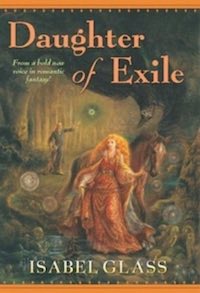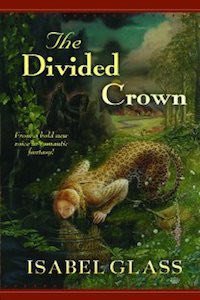Being Isabel Glass


Lisa Goldstein Interviews Lisa Goldstein
Why did you write Daughter of Exile and The Divided Crown under a pseudonym?
Because they're a bit different from the other books I've written, and the publisher thought a pseudonym would be a good idea.
Different how?
They're high fantasy (or mythic fantasy, or that stuff with wizards and kings in it — and why isn't there a good name for this genre? High fantasy makes it sound like there's a hierarchy, with other types of fantasy somehow lower or less privileged).
Why are you writing high fantasy?
Because I love it. I was one of those people who read The Lord of the Rings every year of my adolescence, one of many in my generation almost literally stolen by the elves. I found an enchantment there I couldn't get anywhere else: far, magical countries, great deeds, beauty and joy and terror. A sense of something outside or beyond everyday life. A sense of the numinous.
I also saw that you could, paradoxically, reveal truths in high fantasy that you couldn't anywhere else, that an imaginary place could be as real as the world you inhabit, though in a different way. J.R.R. Tolkien, of course, put it much better. According to Humphrey Carpenter's biography, C.S. Lewis said to Tolkien, "Myths are lies, though lies breathed through silver." "No," Tolkien replied, "they are not."
(I should make it clear here that I don't at all put myself in the same company as Tolkien, and that I'm not claiming to be in possession of some great truth. I just want to live in other worlds, magical worlds, and I always have.)
Aren't you just writing high fantasy because it's popular these days?
Yes, someone actually asked me this, believe it or not. I hope the answer to the last question makes it clear I'm doing no such thing. And I don't know if fantasy is all that popular, anyway. Certainly some series are doing very well, but the huge numbers of books out there, and the fact that no one has time to read all of them, that there's no way to separate the good from the bad, means that most of these will probably get ignored.
A writer once asked me what I was working on, and when I told him I was writing a fantasy he laughed disparagingly and then walked away. So I'd say that fantasy, while popular in some circles, is definitely looked down upon in others. (Yes, I'm talking about you, the post-punk, cutting edge writer of hard science fiction I met at that convention party a few years ago.)
Do you really think that this person would be reading your website?
Good question. No, probably not.
Why Isabel Glass?
"Isabel" is taken from the dog park I go to, Point Isabel. I picked "Glass" to fit various ideas Tor has about pseudonyms — that they should be short, and fall in the first half of the alphabet. (Knowing this, you can probably spot many of the pseudonyms out there on the shelves these days.)
Why are you revealing that you wrote these books now?
Because I told people that I was writing books under a pseudonym, and several of them said that they wanted to read them. Books have such a short shelf-life these days that I wanted to make sure readers who collected my hardcovers had an opportunity to get them before they disappeared completely.
How were the books received?
Well, for the most part. Kirkus Reviews called the first book, Daughter of Exile, an "ingeniously plotted, tellingly detailed, and pleasingly peopled fantasy debut." The Barnes and Noble Review said that "Glass could very well be on her way to becoming the next generation's answer to... storytellers such as Norton and McKillip. With strong female characters and a masterfully complex plot, Daughter of Exile is everything good fantasy should be: richly described, compulsively captivating, and singularly imaginative." Patricia McKillip herself called it "an intriguing and fast-paced journey," something that made me very happy, since she's one of my favorite fantasy writers. Of the second book, Locus said, "The Divided Crown is convincing, human, and even wrenching, with more complications and higher stakes than Daughter of Exile... filled with action, magic, and intrigue."
(Several of these quotes point out one of the problems of writing under a pseudonym — you are in essence lying to reviewers by pretending to be a beginning writer. I feel awkward about that; if it had been up to me, I wouldn't have used the pseudonym.)
I took a copy of the first book into the library where I work and put it on the shelf, and it's been checked out so many times it's nearly falling apart. Every so often I take a look at it and feel like a proud mother.
Will you write any more Isabel Glass books?
I'm working on another high fantasy novel right now, though it's set in a different world than the first two. I'm discovering that I really like making up a complete world — you don't have to do all that research, for one thing, but on the other hand you're responsible for making sure that everything is consistent, that the world feels organic and whole.
I don't know what name this book will come out under. Because fashions in the publishing world swing back and forth, it might have my real name instead of a pseudonym (which, as I said, would have been my preference to begin with). Watch this space.
Because they're a bit different from the other books I've written, and the publisher thought a pseudonym would be a good idea.
Different how?
They're high fantasy (or mythic fantasy, or that stuff with wizards and kings in it — and why isn't there a good name for this genre? High fantasy makes it sound like there's a hierarchy, with other types of fantasy somehow lower or less privileged).
Why are you writing high fantasy?
Because I love it. I was one of those people who read The Lord of the Rings every year of my adolescence, one of many in my generation almost literally stolen by the elves. I found an enchantment there I couldn't get anywhere else: far, magical countries, great deeds, beauty and joy and terror. A sense of something outside or beyond everyday life. A sense of the numinous.
I also saw that you could, paradoxically, reveal truths in high fantasy that you couldn't anywhere else, that an imaginary place could be as real as the world you inhabit, though in a different way. J.R.R. Tolkien, of course, put it much better. According to Humphrey Carpenter's biography, C.S. Lewis said to Tolkien, "Myths are lies, though lies breathed through silver." "No," Tolkien replied, "they are not."
(I should make it clear here that I don't at all put myself in the same company as Tolkien, and that I'm not claiming to be in possession of some great truth. I just want to live in other worlds, magical worlds, and I always have.)
Aren't you just writing high fantasy because it's popular these days?
Yes, someone actually asked me this, believe it or not. I hope the answer to the last question makes it clear I'm doing no such thing. And I don't know if fantasy is all that popular, anyway. Certainly some series are doing very well, but the huge numbers of books out there, and the fact that no one has time to read all of them, that there's no way to separate the good from the bad, means that most of these will probably get ignored.
A writer once asked me what I was working on, and when I told him I was writing a fantasy he laughed disparagingly and then walked away. So I'd say that fantasy, while popular in some circles, is definitely looked down upon in others. (Yes, I'm talking about you, the post-punk, cutting edge writer of hard science fiction I met at that convention party a few years ago.)
Do you really think that this person would be reading your website?
Good question. No, probably not.
Why Isabel Glass?
"Isabel" is taken from the dog park I go to, Point Isabel. I picked "Glass" to fit various ideas Tor has about pseudonyms — that they should be short, and fall in the first half of the alphabet. (Knowing this, you can probably spot many of the pseudonyms out there on the shelves these days.)
Why are you revealing that you wrote these books now?
Because I told people that I was writing books under a pseudonym, and several of them said that they wanted to read them. Books have such a short shelf-life these days that I wanted to make sure readers who collected my hardcovers had an opportunity to get them before they disappeared completely.
How were the books received?
Well, for the most part. Kirkus Reviews called the first book, Daughter of Exile, an "ingeniously plotted, tellingly detailed, and pleasingly peopled fantasy debut." The Barnes and Noble Review said that "Glass could very well be on her way to becoming the next generation's answer to... storytellers such as Norton and McKillip. With strong female characters and a masterfully complex plot, Daughter of Exile is everything good fantasy should be: richly described, compulsively captivating, and singularly imaginative." Patricia McKillip herself called it "an intriguing and fast-paced journey," something that made me very happy, since she's one of my favorite fantasy writers. Of the second book, Locus said, "The Divided Crown is convincing, human, and even wrenching, with more complications and higher stakes than Daughter of Exile... filled with action, magic, and intrigue."
(Several of these quotes point out one of the problems of writing under a pseudonym — you are in essence lying to reviewers by pretending to be a beginning writer. I feel awkward about that; if it had been up to me, I wouldn't have used the pseudonym.)
I took a copy of the first book into the library where I work and put it on the shelf, and it's been checked out so many times it's nearly falling apart. Every so often I take a look at it and feel like a proud mother.
Will you write any more Isabel Glass books?
I'm working on another high fantasy novel right now, though it's set in a different world than the first two. I'm discovering that I really like making up a complete world — you don't have to do all that research, for one thing, but on the other hand you're responsible for making sure that everything is consistent, that the world feels organic and whole.
I don't know what name this book will come out under. Because fashions in the publishing world swing back and forth, it might have my real name instead of a pseudonym (which, as I said, would have been my preference to begin with). Watch this space.